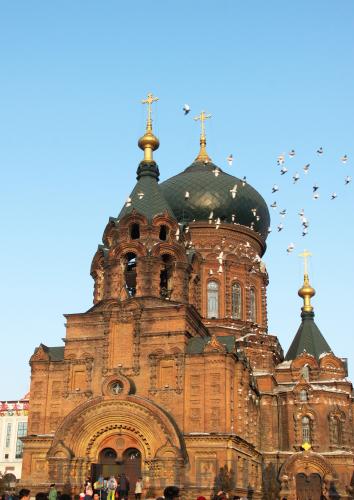|
 |
|
GRAND APPEARANCE: The Saint Sophia Cathedral dominates the cityscape in Harbin (CFP) |
Beautiful melodies echo throughout a newly refurbished synagogue in Harbin, capital of northeast China's Heilongjiang Province on the border with Russia, on an August evening. A small concert is being held by four female Russian violinists. The compositions they play include both Chinese songs, such as Butterfly Lovers and Jasmine Flower, and Russian ones, like Katyusha.
The synagogue is located on Tongjiang Street in Harbin's Daoli District. It was built in the early 20th century, and has a history that spans more than 100 years.
"When the Chinese Eastern Railway began construction, a large number of Jewish Russians swarmed to Harbin. By the 1920s, the number of Jews living in the city had reached over 20,000," said Li Shuxiao, a researcher with the Jewish Research Center of the Heilongjiang Provincial Academy of Social Sciences.
"The synagogue used to be a place for Jews to carry out religious ceremonies and political and social activities," Li said.
Built by Russians in the late 1890s and early 1900s, the Chinese Eastern Railway ran across northeast China to link the Russian cities of Chita and Vladivostok. The railway centered on Harbin, with tracks stretching to Manzhouli, Inner Mongolia in the west and Suifenhe, Heilongjiang in the east and a southern branch reaching Dalian, Liaoning, measuring around 2,400 km in total. The route helped Russia divert natural resources from northeast China and strengthen its control of the Far East.
Harbin opened to foreign trade in 1905. At that time, many Western immigrants flocked to the city: Over 200,000 immigrants from more than 30 countries came to call Harbin home, and 19 countries set up consulates there. Soon after, the city developed into a highly international metropolis.
Russian culture has exerted the most prominent—and lasting—influence upon the city, among the Western cultures once present there. Just last year, the Harbin Municipal Government launched a 100-million-yuan ($16.3 million) project to revamp the old Russian Jewish synagogue to fit its original appearance. The project finished in May this year. The main hall of the synagogue has been transformed into a concert hall, designed for string instrument performances, and every week, four small evening concerts are put on in the building.
"The concert hall aims to provide a place for citizens, music lovers and tourists to listen to music," said Qu Ming, Chairman of the Harbin Culture and Tourism Corp. "It's not enough to simply renovate the old synagogue. Putting on musical performances in the old building gives it new life."
The concert hall has given the city a vibrant musical atmosphere, together with the Harbin Summer Music Concert. This summer event was started in 1961 and has been held 31 times since. In 2010, Harbin was even awarded the title of a UNESCO City of Music.
Indeed, the city has always held a fascination for classical music lovers thanks to its Russian influence. In 1925, a Russian violinist and his wife founded the Glazunov Conservatory of Music, which is located near the synagogue. After a suspension of 78 years, it reopened in August.
The Harbin Conservatory of Music, another school of music that is currently under construction, will recruit students in two years. "The conservatory will cooperate with Russian music experts in the future to develop into a cradle for nurturing outstanding musicians," said Lu Hao, Governor of Heilongjiang Province, on August 16 at the opening ceremony of a provincial tourism bureau-sponsored activity for the 100 top travel agencies in China. This activity was held to attract travel companies to offer more tour packages in the province.
"In the meantime, the conservatory serves to enrich the city's cultural atmosphere and improve Harbin's image as an official City of Music," Lu added.
| 